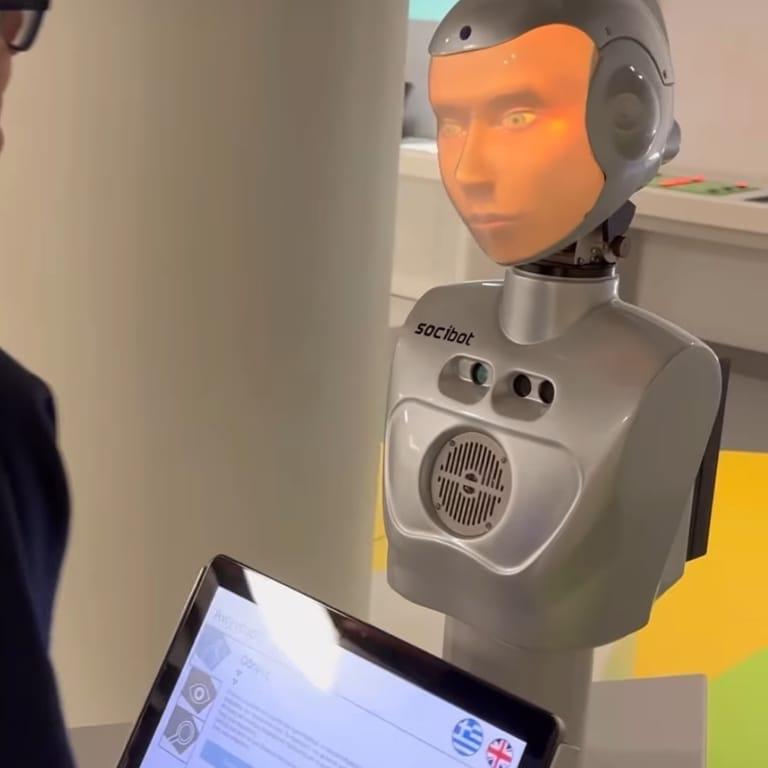
Eugenides Foundation New Digital Planetarium
Palaio Faliro, Greece
Explore the wonders of the Eugenides Foundation New Digital Planetarium in Athens Greece
Nestled in the vibrant city of Palaio Faliro, Athens, the Eugenides Foundation New Digital Planetarium offers an unforgettable journey through the cosmos. This interactive planetarium boasts a huge spherical dome that immerses visitors in stunning digital 3-D space films and IMAX movies. Whether you're a seasoned space enthusiast or traveling with family, this attraction delivers a captivating blend of education and entertainment.
What to expect during your visit
Step inside and be amazed by the planetarium's cutting-edge projection technology that creates breathtaking views of the solar system, distant galaxies, and cosmic phenomena like solar storms and the aurora borealis. The venue is well-organized, clean, and staffed by friendly personnel who enhance the experience for all visitors. You can expect multiple daily shows, each designed to engage and educate audiences of all ages.
Accessibility and language options are thoughtfully provided. Visitors can purchase or bring headphones, with English available among multiple language tracks, ensuring an inclusive experience for international guests.
Family-friendly educational adventures
Perfect for families and school groups, the planetarium offers engaging workshops and shows specifically designed for children. These programs inspire curiosity about astronomy and the universe, making learning fun and memorable. Parents appreciate the affordability, value, and the chance to spark a love for science in young minds.
Tips for planning your visit
- Operating hours vary throughout the week, with hours from 9:00 AM to 5:00 PM on Mondays, extended evening hours on Tuesdays, and 9:00 AM to 9:00 PM from Wednesday through Sunday. Check the official site for current times.
- Ticket purchase in advance is recommended, especially during peak times, to guarantee entry to popular shows.
- Bring or buy headphones to access English and other language translations for the shows.
Community favorite FAQs
- What are the operating hours of the Eugenides Foundation New Digital Planetarium? The planetarium operates Monday to Sunday with hours ranging from 9 AM to 10 PM depending on the day. Visitors should consult the official website for the latest schedule.
- Are there English language options available for the shows? Yes, English translations are available through headphones that visitors can bring or purchase at the gift shop for a small fee.
- Is the planetarium suitable for children? Absolutely, it offers child-friendly workshops and shows that make it an ideal family destination.
Why visitors love the Eugenides Foundation Planetarium
Visitors consistently praise this planetarium for its immersive digital experiences, affordable ticket prices, and exceptional customer service. Families appreciate the educational content and friendly environment, while astronomy buffs enjoy the detailed and visually stunning presentations that bring the universe closer to home. The positive community sentiment highlights it as a must-visit spot for anyone in Athens seeking an extraordinary space adventure.
Eugenides Foundation New Digital Planetarium
Nestled in the vibrant city of Athens, the Eugenides Foundation New Digital Planetarium stands as a beacon of astronomical education and immersive entertainment. Since its inception in 1966, this iconic institution has been captivating visitors with its groundbreaking approach to exploring the cosmos and the natural sciences.
A rich history of innovation and growth
The Eugenides Foundation Planetarium first opened its doors in 1966, marking a milestone as the first planetarium in Greece and Southeastern Europe. This pioneering spirit set the stage for decades of development, positioning the planetarium as a cultural and scientific landmark within the region.
A transformative moment arrived in 2003 with the reopening of the New Digital Planetarium. Equipped with cutting-edge digital projection systems, it became one of the largest and most technologically advanced planetariums globally. This leap forward enabled an unprecedented level of immersive space films and IMAX presentations on its enormous spherical surface, making it a must-visit for astronomy enthusiasts and curious travelers alike.
Milestones along the journey
- 1966: Eugenides Foundation Planetarium opens its doors, becoming the first in Greece and Southeastern Europe.
- 2003: The New Digital Planetarium reopens with advanced digital projection systems, enhancing its global standing.
- 2013: Celebrates 10 years of operation with over 3.5 million visitors and 30,000 shows.
- 2024: Surpasses 7 million visitors, solidifying its position as a leading educational and entertainment venue.
Visitor experience and educational impact
The Eugenides Foundation New Digital Planetarium offers an engaging blend of education and entertainment, making it a favorite attraction for families, students, and tourists. Its large digital dome presents spectacular 3-D space films and natural sciences documentaries that stimulate curiosity and deepen understanding of the universe.
With over 7 million visitors since its modernization, the planetarium is renowned for its accessibility and visitor-friendly approach. It accommodates diverse languages through hearing devices and ensures a welcoming environment for children and adults alike. The combination of advanced technology and passionate educational programming continues to inspire awe and learning among all ages.
Why you should visit
- Immersive space films on one of the largest digital domes worldwide.
- Family-friendly environment with programs suitable for children and adults.
- Multilingual accessibility through hearing devices for an inclusive visitor experience.
- Educational and entertaining destination for science lovers and casual visitors.
Eugenides Foundation New Digital Planetarium Athens Greece Overview
Located in Palaio Faliro, Athens, the Eugenides Foundation New Digital Planetarium offers an immersive educational experience that captivates visitors with state-of-the-art technology and interactive exhibits. This planetarium features an enormous spherical dome perfect for digital 3-D space films and IMAX movies, making it a top attraction for astronomy enthusiasts and families alike.
Highlights and visitor appeal
Designed to be family friendly and suitable for all ages , the planetarium offers affordable tickets and convenient online booking options, including group discounts. Visitors appreciate the English language options and hearing devices that accommodate several languages, enhancing accessibility. Customer service is frequently praised for flexibility and accommodating schedule changes without extra charges.
What to consider before visiting
While the planetarium offers a memorable experience, some visitors have noted a few drawbacks. Language options beyond English are limited, which may affect non-English speakers. The ticketing system can sometimes encounter issues, especially on busy days, so purchasing tickets in advance is highly recommended to avoid disappointment due to peak day crowds.
Top reasons to visit
- Immersive educational shows using cutting-edge digital technology that bring astronomy and space science to life.
- Affordable entry fees and convenient online ticketing with group discounts and flexible booking options.
- Family-friendly atmosphere and exhibitions that engage visitors of all ages, including young children and teenagers.
- Exceptional customer service praised for accommodating visitors and making changes without extra fees.
Closed - Opens 9:00 AM
Monday
09:00–17:00
Tuesday
09:00–22:00
Wednesday
09:00–21:00
Thursday
09:00–21:00
Friday
09:00–21:00
Saturday
09:00–21:00
Sunday
09:00–21:00
Aggregated Ratings 4.6
Loading map...
Gallery



See all images
Comments

